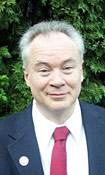
Paul Werbos
Paul Werbos began training as a mathematician, taking many university courses culminating in the graduate course in logic from Alonzo Church at Princeton while in middle and high school. Realizing the limits of deductive logic, he began his quest to understand inductive logic and intelligence in the mind back in those days, inspired by the work of John Von Neumann, Donald Hebb and early AI (Feigenbaum and Feldman). He obtained two degrees in economics from Harvard and the London School of Economics, divided equally between using mathematical economics as a model for distributed intelligence and developing some broader understanding. For his Harvard M.S., he took courses in quantum field theory (QFT) from Julian Schwinger, but did not fully understand the subject until many years later, after he started an activity in quantum technology and modeling at the National Science Foundation (see his papers at arxiv.org.)
For his 1974 Harvard PhD thesis (reprinted in The Roots of Backpropagation, Wiley 1994), he proposed the development of more powerful, more biologically plausible reinforcement learning systems by the then new idea of using neural networks to approximate dynamic programming (ADP), including the value function. In order to implement ADP in a local biologically plausible manner, he translated Freud’s theory of “psychic energy” into an algorithm later called backpropagation, and a rigorous general theorem, the chain law for ordered derivatives, which later also became known as the reverse method or adjoint method for automatic or circuit-level differentiation. He has spent many years advancing the fields of ADP and backpropagation and brain-like prediction, aimed at developing and demonstrating the kind of designs which could actually explain the kind of general intelligence we see in the brain and in subjective human experience – collaborating at times with Karl Pribram and Walter Freeman and Pellionisz among others, and proposing biological experiments to test the theory.
In looking for applications which are really important to areas like energy, sustainability and space, he has also gotten deep into domain issues and organization, as reflected at www.werbos.com, serving on boards of the National Space Society, the Millennium Project, the Lifeboat Foundation, and the IEEE Energy Policy Committee, and as a Fellow in the Senate in 2009. From 1980-1989, he developed official econometric forecasting models (two based on backpropagation) and was lead analyst for the long-term future at EIA in the Department of Energy.







